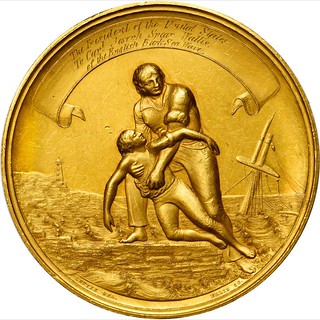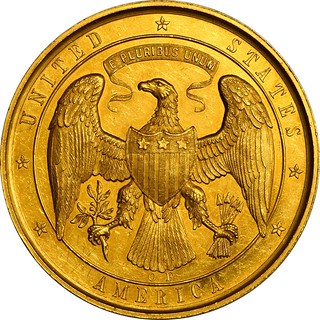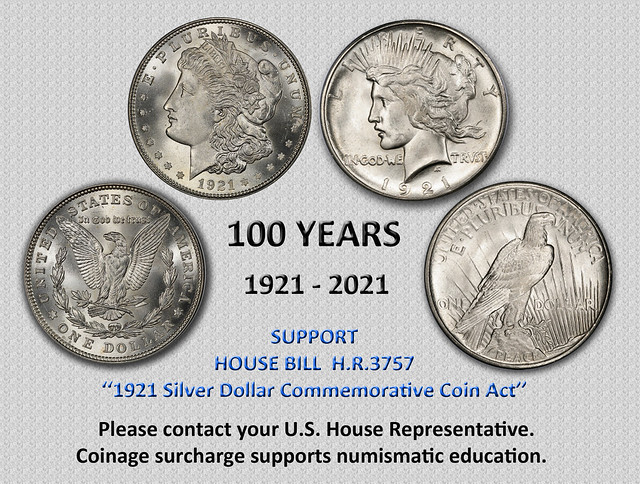
PREV ARTICLE
NEXT ARTICLE
FULL ISSUE
PREV FULL ISSUE
1861 GOLD LIFE SAVING MEDALMy Stack's Bowers November sale catalogs arrived with a thud on Friday. There's a lot of material to go through and I wish I had time to highlight more of it. Here's one lot that particularly caught my eye - a magnificent gold lifesaving medal. -Editor   Undated (1861) State Department Life Saving Medal. First Class. Gold. 67 mm. 222.10 grams. Julian-LS-1. By Salathiel Ellis, after Emmanuel Leutze. MS-60 (NGC). Obv: The Great Seal of the United States with a heraldic eagle at center, E PLURIBUS UNUM above and the legend UNITED STATES OF AMERICA around. Rev: A scroll engraved THE PRESIDENT OF THE UNITED STATES / TO CAPT JOSEPH SPEAR WALLIS / OF THE ENGLISH BARK SEA WAVE above scene of a rescue along a shoreline. LEUTZE DEL. and ELLIS SC. below. This is an absolutely magnificent rarity from the US Mint representing one of the very earliest Life Saving medals awarded by the State Department. Measuring 67 mm in diameter and weighing in at over 7 troy ounces, it is remarkably impressive to examine in hand. The surfaces are a vibrant brassy-gold hue with tinges of apricot patina in the protected areas. Richly frosted luster on the devices contrasts considerably against the watery and reflective fields. The rims are sharp and square, with traces of a wire edge around much of the obverse. Minor hairlines show in the fields but the surface are free from any brightness or distracting abrasions. A pair of small marks in the left reverse field are the only consequential imperfections, but even these fail to draw the eye. The complexion remains attractive and well-composed, with eye appeal that is absolutely superior for the assigned grade. This captivating gold medal was awarded to British Captain Joseph Spear Wallis for his rescue of passengers from the American ship David Brown, which sunk into the Atlantic in January 1861. The David Brown was a clipper based in San Francisco that was charted to transport wheat to Liverpool, England. It set out October 11, 1860 in the control of Captain Gordon G. Berry and began to make its way down and around South America and into the open Atlantic. It was occupied by 22 crewmembers and 24 passengers on this journey. The David Brown started to take on water shortly after entering the Atlantic and was eventually abandoned by her crew in the open ocean on January 6, 1861, midway between South America and north western Africa. The occupants were split between two lifeboats and floundered for 10 days, suffering from exposure, hunger and thirst, before being recovered by a pair of ships. These included the Spanish Observador and the British Sea Wave, which was in command of Captain Joseph Spear Wallis. The Sea Wave rescued the lifeboat containing four crew members and five male passengers, and brought them to their original destination of Liverpool. RW Julian notes that the earliest correspondence regarding these medals in August 1858 suggested a format the same size as the double eagle, so around 34 mm in diameter. However, Mint Director James Ross Snowden desired that it should be much larger than that, resulting in the magnificent gilded canvas offered here. The LS-1 medal was engraved by Salathiel Ellis but designed by Emmanuel Leutz, who is most famous for his painting of George Washington crossing the Delaware river. Julian reports that 19 gold, 10 silver and 34 bronze examples were struck for official purposes from 1860 through 1874, with additional bronze examples struck for sale to the public beginning in late 1861. These unawarded bronze examples struck for sale are the ones most often encountered, lacking an engraving on the reverse scroll. This piece is one of just three known LS-1 medals in gold, and the other two are currently part of the Alan V. Weinberg Collection. Though all three were struck and issued within two years of each other, the two other medals show a couple of interesting differences compared to the present piece. They both feature two full lines of engraving on the scroll, while three short lines are inscribed on this example. Most interestingly, the other two are dated in the engraving, 1860 and 1861, while this example remains undated. These differences are likely attributed to the change of administration that came with the inauguration of President Abraham Lincoln on March 4, 1861. We can also confidently attribute this medal to Lincoln's presidency based on when it was awarded. While the rescue occurred in January 1861 under the presidency of James Buchanan, we do not hear any news of this medal until later that year, well into Lincoln's tenure. Though undated, this medal is first announced in the August 1861 issue of The Mercantile Marine Magazine published in London. It explains that "the President of the United States has awarded to Mr. Joseph Spear Wallis, a gold medal for his benevolence and humanity" involving the rescue of passengers from the David Brown.  That's a mouthful of text to fit into three lines in such a narrow space. I can imagine the engraver thinking, "I'm not doing THAT again!" Great piece. I've always enjoyed the drama of lifesaving medals, and collect Carnegie Hero medals myself. Gold examples are always impressive, especially in this large size. -Editor To read the lot description, see:
 Wayne Homren, Editor The Numismatic Bibliomania Society is a non-profit organization promoting numismatic literature. See our web site at coinbooks.org. To submit items for publication in The E-Sylum, write to the Editor at this address: whomren@gmail.com To subscribe go to: https://my.binhost.com/lists/listinfo/esylum All Rights Reserved. NBS Home Page Contact the NBS webmaster 
|